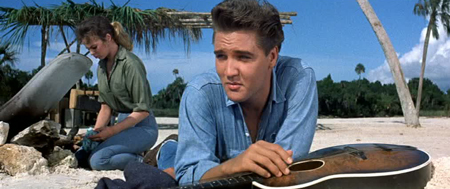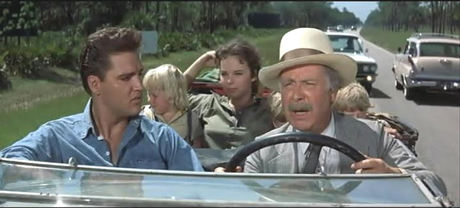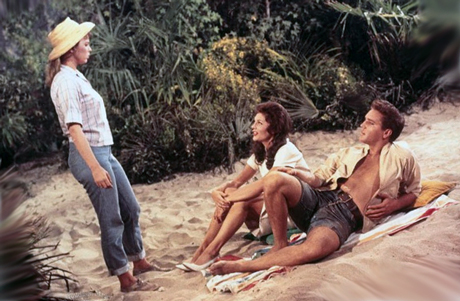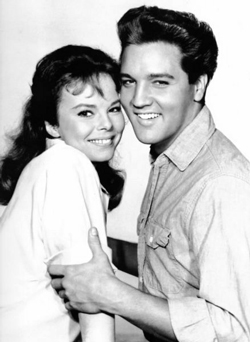Reviewed by Glenn Erickson
A waste of a monumental talent if there ever was one, Elvis Presley was steered toward a bulls-eye marked Maximum Profit, and kept there so consistently that his post-Army career didn't develop in any satisfying way. He eventually ended up a self-parody, a Vegas legend hiding behind sunglasses and gussied up in glitter like Liberace.
His movies suffered the most, thanks to the "Follow that Money" mantra of his handler Col. Tom Parker. After a few attempts at dramatic roles, Elvis films settled into a sickly pattern -- he came on screen as some kind of fantasy figure, kissed some girls, sang a lot of songs and maybe knocked out some bad guys. It's an Elvis movie, about Elvis, and Elvis is in nearly every scene. That's all that mattered.

When I worked for MGM home video in the late 1990s the women executives in charge of home video marketing cooked up some good promotions to squeeze the most out of the MGM-UA Elvis films. But they approached the King of Rock and Roll as if he were a camp figure, like Pee-Wee Herman. The lead marketer was probably born not long before Elvis gave up movies in the late 1960s. Nobody could sit through whole shows, but she liked to watch the edited clips. I asked what the appeal was -- my taste normally didn't align with hers -- and she said, "He's a sexy dancer. Real good moves." There you go, case closed, Elvis is immortal and I'm not quite sure what the point would be of reviewing his movies like ordinary movies.
Now, I've seen and enjoyed Jailhouse Rock and Flaming Star and am told there are several other notable titles. Most of the other Elvis films I've only seen parts of before drifting away. Not even Ann-Margret and some great dance choreography could get me through Viva Las Vegas. But 1962's Follow that Dream always garnered good blurbs in the old TV Guides, as something special. It has a competent director in Gordon Douglas and the story idea came from a real book, not the back of Tom Parker's doodle pad. Besides, I've always liked the title song -- the Elvis organization always had one solid radio hit per movie, surrounded by a medley of musical rejects.
Money must have lured Elvis and Parker away from MGM. The Mirisch Corporation made both Kid Galahad and this show in quick succession. Almost all of it plays out on a stretch of Florida beach. It has competent performers making the most of a script aimed at the 'folksy' audience -- those rural customers that Hollywood has always condescended to. The original screenplay by Herman Raucher may have been a coherent satire about squatters & welfare freeloaders versus the big bad guv'ment. Or it may have been an absurd cartoon comedy impinging on Al Capp territory. But those ideas end up being squashed into an Elvis Movie, where nothing has to make sense.

Public assistance leeches Pop and Toby Kwimper (Arthur O'Connell & Elvis Presley) run out of gas on a new stretch of Federal land down Florida way, and decide to homestead it. They take care of four orphans: a little girl, twin boys and Holly Jones (talented Ann Helm), a "Tammy-" like natural country girl. Holly also turns out to possess the head for business that Pop and Toby lack. The locals discover that the Kwimper's hijacked real estate is loaded with game fish. Toby almost gets himself arrested for bank robbery, a big misunderstanding. But he charms bank manager Mr. Endicott (Herbert Rudley) and thus gets a $2,000 loan to open a bait stand and snack shop. Obnoxious state official Mr. King (Alan Hewitt) can't put the squatters out of business, so he unleashes Welfare Psychologist Alisha Claypoole (beautiful Joanna Moore) on them. Much to Holly's chagrin, Alisha tries to seduce Toby; when he proves impervious to her kisses, she determines to have the Kwimper children seized by the state. Toby has other problems too: seizing on the fact that the federal beach is off limits to local and state cops, gangsters Carmine and Nick (Jack Kruschen & Simon Oakland) plunk down their floating gambling trailer next to the Kwimpers. Nick tries to use force to get his neighbors to scram, but Toby routs the crooks by sheer dumb luck, not even realizing that they're trying to kill him (maybe).
Follow that Dream is basically dumbsville. It lacks charm and flops around with an incoherent satire about 'freedom-loving' anti-government chiselers that will please disgruntled Tea Party types. No, wait, those Tea Party types believe in defying anything resembling reasonable government regulation. Let's stay away from any notion that Follow that Dream makes rational sense.

The governor is a hypocrite and the state official is made to seem a fool for trying to keep land thieves from stealing public property. The psychologist is an educated woman in a position of authority and therefore an untrustworthy, sexually frustrated menace to virginal hunks in tight blue jeans. And somebody please direct me to Mr. Endicott, a banker who gives "character loans" to bums that share his favorite pastime, fishing. Maybe banker Endicott is a future version of banker Fredric March from The Best Years of Our Lives, the guy who just wanted to give honest working men access to capital. Except the Kwimpers are 'magical hicks' that talk like morons yet possess the wisdom and judgment of the ages.... when not happily ripping off society.
Speaking of Magical Hicks, Elvis's Toby is superhumanly strong and so innocent that 'bad people' can't touch him. He disarms cops and crooks alike and gets away with it. He talks like Jed Clampett (didn't Elvis find that demeaning?) yet sings ballads with perfect diction. He's both irresistible and (initially) sexless. Professing to distrust women, he shields himself from their siren wiles by reciting multiplication tables. Toby reserves his sex appeal come-on for the movie's very last scene, 'ordering' the impassioned Holly to kiss him while role-playing the technique of the 'bad girl' Alisha. Their big smooch is interrupted with the payoff to a tasteless running gag about Pop's volcano-like outhouse toilet.

What's good about Follow that Dream? Actually, plenty. Elvis definitely holds the screen like star material, and we can't actually tell if Toby is really stupid as a lard pail or only acts that way to flummox the bad guys. Greater minds than mine will need to answer that one. Producer David Weisbart backs Elvis with sterling support talent. Anne Helm (The Magic Sword; The Couch) is all pep and spirit as Holly, who does all the housework and then gets criticized for 'nesting'. She's surely one of The's King's most endearing leading ladies. The under-appreciated Joanna Moore is stunningly intelligent in a thankless role; her reactions of arousal while hovering over Elvis are, uh, stimulating. Movie fans will note that the film de-sexes Elvis by making him play passive. It's the women that become hot 'n' bothered. The King typically lies in the sand with his shirt open, waiting for the girls to come to him. It almost seems perverted.
Actors Simon Oakland and Jack Krushchen are each fresh from a Mirisch Co. Oscar winner. They mesh beautifully with their roles as cartoon hoods, making that section of the movie fairly amusing. Arthur O'Connell acts up a storm, making Pop's verbal shenanigans sound consistent. But the charm and the message breaks down in the final hearing before a judge -- which is about as lame as a courtroom scene can be. Elvis gets the judge on his side by whispering in his ear, which is questionable both as courtroom procedure, and as sexual conduct.
Finally there's the title tune, sung in that patented Elvis echo chamber that makes our crooner's voice sound bigger than Caruso's. I've had to cut many montages of United Artists product for home video use, and whenever a selection of musical hits is needed I always reach for the scene featuring "Follow that Dream", by Bernie Weisman & Fred Wise. Elvis sings it lying flat on his back on some sand, with his shirt unbuttoned. He looks distracted and barely stays in sync with the playback. Halfway through the song The King starts scratching himself, and continues to do so when he rolls over. That's glamour for you.
The Twilight Time Blu-ray of Follow that Dream is a handsome HD encoding of this Panavision show, with bright colors that begin a bit cold in the title sequence and then warm up nicely. The audio is un- stereo-fied monaural. The Isolated Score Track gives us Hans Salter's music cues in the clear. The Elvis tunes are basically unchanged, as little if any natural audio is allowed on screen when the King sings. It is pretty silly, however, when a songs ends by slowly fading out. Elvis is right there continuing to mouth the words, as his voice retreats into the Twilight Zone. I always felt sorry for pop singers on TV shows lip synching to their own records -- the illusion is ruined when the record fades out. 1

The original trailer looks good but its audio track is confusing. To my eyes and ears it looks as if MGM/UA couldn't find the correct audio and substituted Elvis' song "What a Wonderful Life". It fits for length and even syncs well in spots, yet there's plenty of spoken dialogue on screen that isn't heard.
On a scale of Excellent, Good, Fair, and Poor,
Follow that Dream Blu-ray rates:
Movie: sorta Good but with you know who, GREAT
Video: Very Good
Sound: Very Good
Supplements: Trailer, Julie Kirgo liner notes
Deaf and Hearing Impaired Friendly?
YES; Subtitles: English
Packaging: Keep case
Reviewed: August 30, 2014
Footnote:
1. Hm... does anyone remember seeing a live-broadcast variety show in which the poor singer was sabotaged by a scratchy record, or one that skipped?
Return

Text © Copyright 2014 Glenn Erickson
See more exclusive reviews on the Savant Main Page.
Reviews on the Savant main site have additional credits information and are often updated and annotated with reader input and graphics.
T'was Ever Thus.
Return to Top of Page
|

